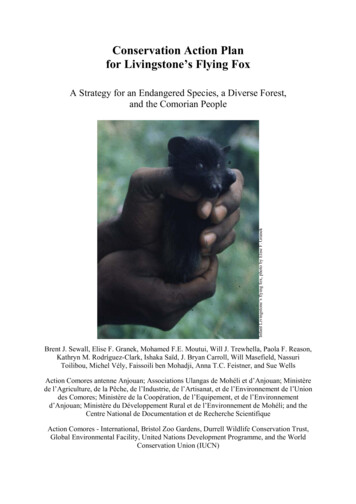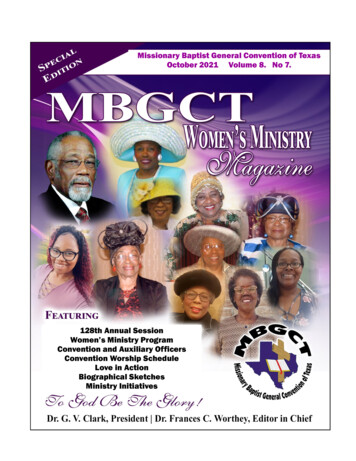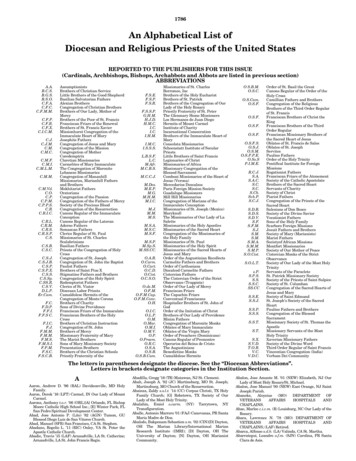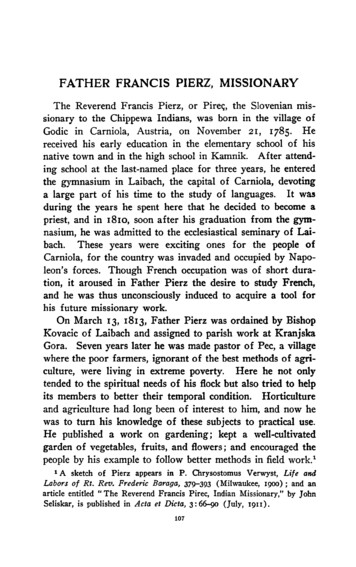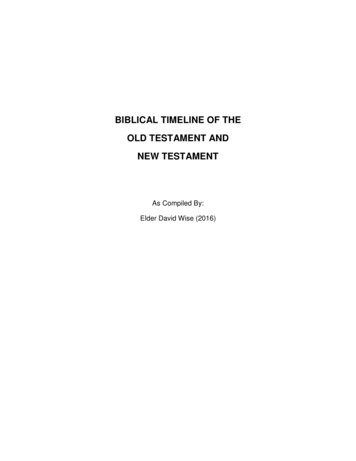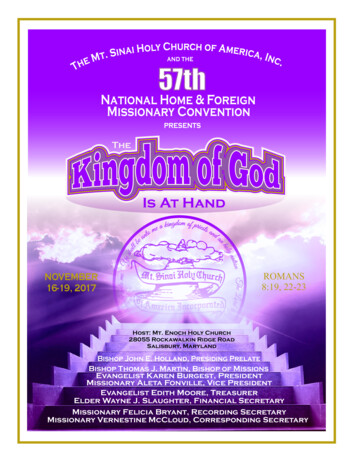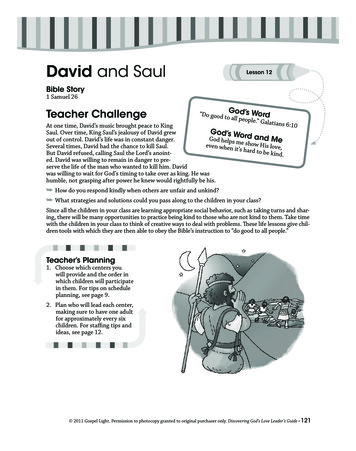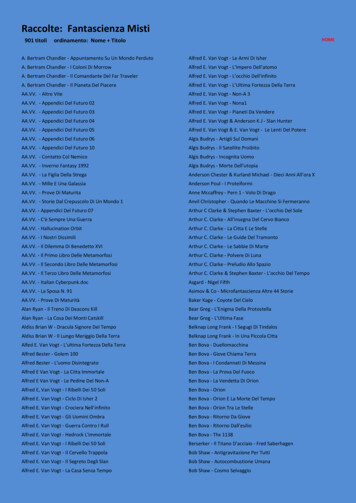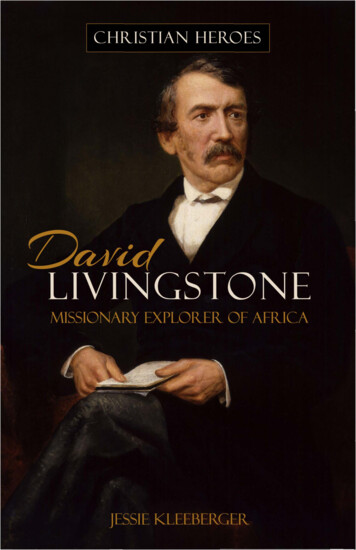
Transcription
DAVID LIVINGSTONEMISSIONARY EXPLOREROF AFRICAByJessie KleebergerDigitally Published byTHE GOSPEL TRUTHwww.churchofgodeveninglight.com
Copyright 1925ByGOSPEL TRUMPET COMPANYPrinted in U. S. A.
ContentsPageThe Child on the Doorstep .1Preparing for His Life Work .6“Anywhere, Provided It Be Forward” .10How the Lion Changed His Mind .17Try Again .24Africa’s Dark Pictures .34Making a Way to the Coast .42From Loanda to Quilimane .47Back in Dear Old England .52Among Old Friends .58Meeting and Parting .63Recalled .71A Stormy Voyage .77A Dead (?) Explorer .82Fallen Among Thieves .89The Good Samaritan .96Alone On His Knees .103The Last Journey .110
Chapter IThe Child on the Doorstep“Mother, do tell us again the story of how your grandfather onceplayed he was crazy.” This was the request of young DavidLivingstone, and it was rewarded by the repetition of that story heand his brothers and sisters liked so well.Their great-grandfather, Gavin Hunter, could write, while mostof his neighbors were totally ignorant of the art. On one occasion apoor woman had him write for her a petition to the minister to haveher allowance increased. And for this he was arrested and taken toHamilton jail. Thoughts of his wife and three hungry children athome made him almost desperate. He remembered how David hadone time saved his life by feigning madness before the Philistines.So he slobbered his beard with saliva, and when a friendly sergeantasked him if he were really mad he confessed that he was onlyfeigning insanity for the sake of his wife and three children at home.He knew they would starve should he have to suffer the usualpenalty, that of being sent either to the army in America or to theplantations. The sergeant secured his release and giving him threeshillings (seventy-two cents) sent him home to his wife and“weans.”
DAVID LIVINGSTONE“Ay,” said the mother, “many a prayer went up for that sergeant,for my grandfather was a godly man. He had never had so muchmoney in his life before, for his wages were only threepence [sixcents] a day.”This story of poverty was only a common one among theancestors of David Livingstone. And that great man, even after hehad won the applause of the world, dared still to claim the poor ashis class, and on the epitaph on the tombstone of his parents heexpressed his thanks to God for “poor and pious parents,” refusingto change the “and” to “but.” Indeed, one look into the beautiful eyesof his mother told of a soul that was strong in her trust in God andlovingly devoted to the care of her family. Five sons and twodaughters there were, but two sons were taken from her in theirinfancy. David, the second of the living sons, was born Mar. 19,1813, in Blantyre, a little village of Scotland.David’s grandfather, who could trace his ancestors back for sixgenerations, could proudly say that he had never heard of one personin the family being guilty of dishonesty. And his last precept to hischildren was—“Be honest.”David’s father was a total abstainer at a time when there was nosuch thing as prohibition and when the idea of abstinence was veryunpopular. He had seen so much of the awful effects of drunkennessthat he was determined his children should never see him drinkliquor. Another new and unpopular cause which he championed wasthe Sunday school. He was a tea peddler, but spent his Sundays andspare time in conducting Sunday schools and prayer meetings, andhe always took a supply of tracts with him when he went out to selltea.He was a kind, but stern man. It was his habit to lock the doorat dusk, at which time all the children were expected to be in the2
DAVID LIVINGSTONEhouse. David one time was tardy, and upon reaching home found thedoor barred. He took the situation very calmly, and having obtaineda piece of bread from someone, sat down quietly on the doorstep,deciding to spend the night there. However, his mother found himand showed mercy. Though only a child, the boy had already learnedthe lesson which proved so valuable to him in his hardships inAfrica—to make the best of the least pleasant situation.Another valuable lesson learned in his childhood was that ofperseverance. When he was only nine years old he learned the entire119th Psalm and repeated it with only five mistakes. His reward thistime was a New Testament from his Sunday school teacher. But thehabit of persevering in difficult tasks became a part of his life, andit was that which took him through the trackless jungles of Africaand made him a blessing to that dark continent.Grim poverty cut short the school days of the promising lad andsent him to work in the cotton factory at the age of ten. “It went tomy heart like a knife,” his mother said. “And yet I was as proud asa queen last Saturday night when he brought me his first week’swages, a whole half-crown [sixty cents], and threw it into my lap.”The first wages he spent for himself went for a Ruddiman’sRudiments of Latin; for the wolf that robbed him of his boyhoodschool days could not steal from him the ambition that makes theworld’s great men. He attended an evening class from eight to ten.Then going home, he would study till twelve o’clock or later if hismother did not awaken and snatch the book from him. Then,beginning at the mill at six o’clock in the morning, he would workuntil eight o’clock at night, stopping only for his meals.David, like his father, was very fond of reading. He devouredevery book that came into his hands. Novels, however, were neverallowed in the house. While at work he would place a book on his3
DAVID LIVINGSTONEspinning jenny and manage to catch a sentence occasionally, thoughhe never had more than one idle minute at a time. Thus, by makinguse of every moment, he acquired for himself a liberal education,and friends were surprised in after years to hear him quote longpassages from the classics.A holiday once in a while gave David and his brothers a chanceto roam the country in search of botanical, zoological, andgeological specimens. The story is told that he one time caught agood sized salmon, which was against the game laws, and having noother convenient way of hiding it, he put it into the leg of hisbrother’s trousers. Thus he created considerable sympathy for theboy with the swollen leg as they passed through the village on theirway home. He also took a great interest in studying books of science,and later he found this knowledge of great value to him in his workin Africa.Among his brothers and sisters David seemed to be a favorite.It was his delight to give pleasure to the rest of the family. Ifanything interesting happened during the day he was ready to tell itto the family around the evening fireside. He kept up this habit inafter years when he was studying in Glasgow, and his Saturdayevenings at home were eagerly looked forward to by his sisters, forhe would tell all the happenings of the week.David was only twelve years old when he began to feel theawfulness of sin and to wish that God would give him peace in hissoul. Still he felt that he was unworthy to receive such a greatblessing until after the Holy Spirit had worked some miraculouschange in his heart. In his ignorance he waited for that changeinstead of accepting the pardon that Christ offered. And putting itoff, he drove the spirit of conviction from his heart. Still thereremained in his soul a hunger which none but God could satisfy.4
DAVID LIVINGSTONEWas there no rest for him? Would God never send peace? Would hebe lost forever? These were some of the thoughts that haunted himevery little while throughout his teen.It was when he was nearly twenty that he read Dick’sPhilosophy of a Future State. This book showed him his error. Hecould see now that all he needed to do was to seek God with all hisheart, hand over to him the penitent soul, and accept the pardonpurchased by Jesus’ blood on Calvary. “Whosoever will,” Jesus hadsaid, and that meant David Livingstone, too. This new life nowpenetrated the young man’s whole being. The love of God flowedwarm and free through his soul, and he could now say, “For me tolive is Christ.” Anywhere in God’s service he was willing to go.“Now, lad, make religion the every-day business of your life,and not a thing of fits and starts; for if you do, temptation and otherthings will get the better of you.” This was the advice of DavidHogg, one of David Livingstone’s spiritual advisors in the little cityof Blantyre, Scotland, where he lived. And we shall see howcarefully Livingstone made religion the everyday business of hislife.5
Chapter IIPreparing for His Life Work“Others have done it, and I can, too.” So thought youngLivingstone as he set about to prepare himself for missionary work.He had been able to save but little from his meager earnings, for hehad added his share to the family purse. But the story of Gutzlaff inChina, how by his faith and courage he had conquered almostinsurmountable obstacles, had fired Livingstone with a somethingthat he could hardly explain. He, too, would train himself for the lifeof a medical missionary and would enter that dark land where sinand suffering abounded. What mattered it if he should have to meetopposition, mobs, and even death? Jesus had met them all and hadsaid, “Lo, I am with you alway, even unto the end of the world.”But to Livingstone’s great disappointment, the opium warbreaking out about this time closed the door to China. However, hebegan his theological and medical training at Glasgow, in the winterof 1836-37. He had little money, but a strong determination and awillingness to endure hardships. During the six summer months hehad to earn enough to pay his current expenses and his schoolexpenses for the six winter months of school.Accompanied by his father, he walked through the snow fromBlantyre to Glasgow and began a search for lodging. They finally6
DAVID LIVINGSTONEfound a room in Rotten Row for two shillings (forty-eight cents) aweek, and there his father left him. But when David too often foundhis tea and sugar missing he decided it would pay him to rent betterquarters; so he did so.Among his schoolmates was a young man who was a mechanicby trade and who had a bench and turning lathe in his room. Fromhim David learned many things that later proved of the greatestservice to him in Africa. So strong became the friendship betweenLivingstone and Mr. Young, the mechanic, that years laterLivingstone named after him a river which he supposed might beone of the sources of the Nile.During his second session in Glasgow (1837-38) Livingstoneapplied to the London Missionary Society, offering his services as amissionary. He expressed to them his idea of missionary work,showing that he was not anticipating a bed of roses. He said that bythe promised assistance of the Holy Ghost he believed he wascapable of enduring any ordinary share of hardship or fatigue. Hefurther told them that he was not married nor under any engagementof marriage; that he would prefer to go out unmarried; that free fromfamily care he might give himself entirely to the work.In September, 1838, he was called to London to appear beforethe Mission Board. There he chanced to meet a young Englishman,Joseph Moore by name, who became such a fast friend ofLivingstone that the two were compared to David and Jonathan.The two young men were sent by the Mission Board to studyunder the Rev. Richard Cecil, by whom they were given somepractise in preparing and preaching sermons. Their duty was to writeand memorize their sermons and to deliver them as the occasiondemanded. His friend told of one instance when Livingstone was tofill the pulpit in the absence of an eminent divine. He arose and read7
DAVID LIVINGSTONEhis text and then—said abruptly, “Friends, I have forgotten all I hadto say.” Then he hurriedly left the chapel. This failure, added to hishesitating manner in conducting family worship, almost led to hisbeing rejected. But a friend pleaded hard for him, and he was givenanother chance. He went to London to continue his studies and therecompletely won the hearts of his fellow students by his kindness andsympathy to all about him, though none considered him a man ofany great ability. It was only during his last year in London that hecame to his intellectual manhood and showed his real power.“About this time Livingstone came in contact with RobertMoffat, who on his furlough in England was creating much interestin his South African mission. Then it was fully decided thatLivingstone should go to Africa. Gently, but definitely, God wasleading the young man to his field of usefulness.But about the time he was to leave, a severe affliction seizedhim and he was compelled to return to his home in Scotland. Thevoyage and the visit had a wonderful effect, and he was soon in hisusual health.One more trip to Glasgow was necessary and then he returnedhome to spend but one night before he should sail. David had somuch to talk about that he wanted to sit up all night. Of course, hismother objected. At any rate, he sat for several hours talking withhis father of the prospects of Christian missions. The next morning,November 17, they arose at five o’clock. Before leaving, David readthe 121st and 135th Psalms and prayed with the family. His fatherwalked with him to Glasgow where he was to take the steamer forLiverpool. There the father and son looked for the last time on earthon each other’s faces and bade each other a fond farewell. Then witha lonely heart the father walked slowly back to Blantyre, and Davidwas really on his way to dark Africa.8
DAVID LIVINGSTONEOn Nov. 20, 1840, he was ordained a missionary, and onDecember 8, he embarked and sailed for the Cape of Good Hope.On the way the ship stopped at Rio de Janeiro, and he had a littleglimpse of Brazil. That was the only time he was ever privileged tovisit the American continent. He was delighted with the country, butsaddened at the degradation of the people.Arriving at the Cape, he was detained there for a month, thensailed for Algoa Bay, whence he went by land to Kuruman (see mappage 14), in the Bechuana country, the usual residence of theMoffats. Little did he realize then what a blessing the Moffat homeheld for him.9
Chapter III“Anywhere, Provided It Be Forward”“Crossing the Orange River,” said Livingstone, “I got myvehicle aground and my oxen got out of order, some with their headswhere their tails should be, and others with their heads twistedaround in the yoke.” This was his first experience of traveling inAfrica and occurred while he was on his way to Kuruman. But inspite of the difficulties Livingstone enjoyed the freedom oftraveling, camping, and hunting in Africa.On his way he came to a station called Hankey where there hadbeen an epidemic of measles. During this siege the Hottentots hadbegun having prayer-meeting at four o’clock in the mornings. Themeetings were well attended and were so well liked that they werecontinued. But the difficulty from Livingstone’s point of view wasthat the people, having no clocks or watches, sometimes rang thebell for service at the wrong time. Sometimes they were assembledat twelve or one o’clock instead of four. The missionary whobelonged at the station had returned from the Cape with Livingstoneand was welcomed back by the firing of guns in his honor andenthusiastic hand-shaking. The lives of these black Christians werebeautiful, especially compared with those of a Dutch family in theneighborhood. This family spent their Sundays in dancing instead ofworship.10
DAVID LIVINGSTONE11
DAVID LIVINGSTONEThe trip to Kuruman took over two months. There Livingstonewas to await the return of Mr. Moffat, and then with instructionsfrom the Missionary Society to go on farther north to establish a newstation. Having received no orders, he thought of going on intoAbyssinia, where there was as yet no Christian missionary. He wasstrongly opposed to the idea of crowding the missionaries togetheraround the Cape when there were vast regions to the north utterlywithout the gospel. He also believed strongly in the training ofnative workers. Consequently, taking with him another missionaryand two of the best native Christians, he started northward. Abouttwo hundred and fifty miles north of Kuruman he selected a placefor a station. If he could only have employed more native workershe would have been glad, for they won their countrymen much morereadily than the white missionaries could.In writing to his sisters, he told some interesting incidents of thejourney:“Janet, I suppose, will feel anxious to know what our dinnerwas. We boiled a piece of the flesh of a rhinoceros which wastoughness itself, the night before. The meat was our supper, andporridge made of Indian cornmeal and gravy of the meat made avery good dinner next day. When about 150 miles from home wecame to a large village. The chief had sore eyes; I doctored them,and he fed us pretty well with milk and beans, and sent a fine buckafter me as a present. When we had got about ten or twelve miles onthe way, a little girl about eleven or twelve years of age came up andsat down under my wagon, having run away for the purpose ofcoming with us to Kuruman. She had lived with a sister whom shehad lately lost by death. Another family took possession of her forthe purpose of selling her as soon as she was old enough for a wife.But not liking this, she determined to run away from them and come12
DAVID LIVINGSTONEto some friends near Kuruman. With this intention she came, andthought of walking all the way behind my wagon. I was pleased withthe determination of the little creature, and gave her some food. Butbefore we had remained long there, I heard her sobbing violently, asif her heart would break. On looking round, I observed the cause. Aman with a gun had been sent after her, and he had just arrived. I didnot know well what to do now, but I was not in perplexity long, forPomare, a native convert who accompanied us, started up anddefended her cause. He being the son of a chief, and possessed ofsome little authority, managed the matter nicely. She had beenloaded with beads to render her more attractive, and to fetch a higherprice. These she stripped off and gave to the man, and desired himto go away. I afterward took measures for hiding her, and thoughfifty men had come for her, they would not have got her.”Not long after his return from the first journey Livingstone setout on a second tour into the interior of the Bechuana country (seemap page 18). His objects were to better learn the language and totrain more native workers. His companions on this journey were twonative Christians from Kuruman and two other natives who were tomanage the wagons.Bubi, chief of the Bakwains, was one of Livingstone’s bestfriends. His people, too, were honest and never attempted to stealfrom the missionary’s wagon. It is interesting to know howLivingstone got them to dig an irrigation canal. He had promised tobring them rain, as their own doctors professed to do. And this washis method. The men set about it quite willingly, though most ofthem had only sharp sticks with which to dig. Unfortunately thenative teacher stationed with Bubi’s people was taken with a violentfever and had to leave, and Bubi himself was afterward burned todeath by an explosion of gunpowder.13
DAVID LIVINGSTONEWhile passing through a part of the great Kalahari Desert,Livingstone met another friendly chief, named Sekomi, of theBamangwato. The people of his country were so ignorant of thenature of God that they called any being they considered superiorgod. Often Livingstone himself was given that title. One sad incidentthat happened while Livingstone was in this place was an attack ona woman by a lion. The poor woman was devoured while in her owngarden, and the cries of her helpless children were most pitiful.Livingstone was first appealed to by one chief and then byanother to help them out of their difficulties. There were severalreasons for his popularity among the natives. One was his medicalability. But of greater value were his rules of justice, good feeling,and good manners.One time Livingstone wrote in a letter to a friend, “I havepatients now under treatment who have walked 130 miles for myadvice; and when these go home others will come for the samepurpose.” They kept him busy, but he found that the practise hereceived in speaking the language to his patients was a great benefitto him. He had a very active mind, for while he was engaged in hisdifficult travels and was meeting with all kinds of experiences hewas also studying the languages and making scientific observationsof the continent. He wrote to a friend that in the desert he had foundat least thirty-two edible roots and forty-three fruits growing wild.“I wish you would change my heart,” said Sekomi one time.“Give me medicine to change it, for it is proud, proud and angry,angry always.” Livingstone began to tell him of how Jesus wouldchange it, but he would not listen. “Nay, I wish to have it changedby medicine, to drink and have it changed at once, for it is alwaysvery proud and very uneasy, and continually angry with someone.”Then he rose and went away.14
DAVID LIVINGSTONEDuring the journey Livingstone was within ten days’ journey ofLake ‘Ngami, of which he had heard at the Cape. He was too busywith his missionary labors at this time to go in search of the lake.But years later he really discovered it.Part of his journey had to be taken on foot because some of hisoxen had taken sick. On the way he overheard some of hiscompanions talking about him. “He is not strong,” they said. “He isquite slim, and only appears stout because he puts himself in thosebags [trousers]; he will soon knock up.” This was too much for him.He quickened his speed in their walks and kept it up so long thatthey soon confessed that they were beaten.Back to Kuruman again in June, 1842, Livingstone found thatno instructions had yet come from the directors for him. But he couldnot wait idly for such instructions. He went to the assistance ofSebehwe, a chief who was having trouble with neighboring tribes.Sebehwe listened attentively while Livingstone told him the story ofJesus. What joy to know that one more chief was listening to thegospel!He traveled on north to Bakhatla, where he had purposed tobuild a new station in the midst of a fertile country inhabited byindustrious people. They even had an iron mill, and Livingstone,being a bachelor, was permitted to enter. There was no fear of hisbewitching the iron, as was the case with married men. The chiefpromised Livingstone that if he would only come and be theirteacher he would get all his people to make the missionary a garden.But Livingstone could make no definite promises on account of theslowness of the directors.Five days’ journey beyond the Bakhatla was the village ofSechele, chief of the Bakwains. “Tell me,” he said to Livingstone,“since it is true that all who die unforgiven are lost forever, why did15
DAVID LIVINGSTONEyour nation not come to tell us of it before now? My ancestors areall gone, and none of them know anything of what you tell me.” Thiswas a hard question for the missionary to answer, and it remainsunanswered—a challenge to the church.On he went, traveling four hundred miles on ox-back. The skinsof the oxen were so loose that he could scarcely make his overcoatstick on as a saddle. Then, too, he had to sit very erect or be in dangerof being punched by the animal’s horns. But what were thesediscomforts, when in the evenings he could sit around their fires andafter listening to their stories tell them the sweetest story of all?Returning to Kuruman in June, 1843, Livingstone wasoverjoyed to find a letter from the directors authorizing him toestablish a station in the new country. Another welcome letterbrought money for the support of a native worker.Finding another missionary who was willing to accompanyhim, he set out for the proposed station at Bakhatla, and they reachedtheir destination about the last of August, 1843. The chief welcomedthem cordially, and Livingstone proposed buying a tract of land forthe station. He insisted on making the deal in a legal manner with awritten contract to which each party attached his signature or mark.The directors had not given them authority to do this and they wereuncertain whether or not their arrangements would be satisfactory.If they were not, Livingstone said, he was willing “to go anywhere—provided it be forward,”16
Chapter IVHow the Lion Changed His Mind“There is no young woman here in Africa worth taking off one’shat to,” Livingstone wrote to a friend who seemed to be trying topersuade him to marry. But that was before he had his encounterwith the lion.So glad were the Bakhatlas to have the missionaries with themthat they proposed moving to a more suitable location. The spotchosen was in a beautiful valley and was named Mabotsa, or“marriage-feast.” But there was one trouble with the new locality. Itwas infested with lions, and Livingstone one time had anunfortunate encounter with one—unfortunate, did I say? Yet notaltogether so.In a letter to his father he mentions it briefly:“At last, one of the lions destroyed nine sheep in broad daylighton a hill just opposite our house. All the people immediately ranover to it, and, contrary to my custom, I imprudently went with them. . . They surrounded him several times, but he managed to breakthrough the circle. I then got tired. In coming home I had to comenear to the end of the hill. They were then close upon the lion andhad wounded him. He rushed out from the bushes which concealedhim from view; and bit me on the arm so as to break the bone.”17
DAVID LIVINGSTONE“What did you think when the lion had hold of you?” someoneafterward asked.“I was thinking what part of me he would eat first,” was thegrotesque reply.The lion had one paw on Livingstone’s head and was playingwith him as a cat does a mouse, when Mebalwe, his native helper,came to his rescue. The wounded beast then sprang upon Mebalweand bit him in the thigh, then grabbed another man by the shoulder.But in a moment the shots he had received took effect, and he felldead. How grateful Livingstone was then for his faithful Mebalwewhom a recent gift from a Sunday-school in the homeland hadenabled him to hire! However, the lion had left eleven teeth-marksin Livingstone’s arm and had crippled the arm so that he was neverable to use it without pain.And now in his suffering Livingstone’s thoughts turned toKuruman, two hundred miles away. That was the nearest place hecould think of to which he might turn for rest and care. For threeyears while the Moffats were in England the station there had beenhis headquarters. But now they were at home.In spite of his pain Livingstone enjoyed his visit with theMoffats. The Doctor and his wife were kind to him, and he foundtheir daughters, Mary and Ann, intelligent, capable young ladies,and “worth taking off his hat to.” Indeed, the elder daughter, Mary,so revolutionized his mind on the subject of matrimony that he felthimself fast losing hold of his position. In her he saw everything thatwas needed to make an ideal wife for a missionary, and at last, as hehimself said, he “screwed up courage to put a question beneath oneof the fruit-trees.” When the answer came back,—“Yes,”Livingstone was very happy.18
DAVID LIVINGSTONE“The lion was playing with him as a cat does a mouse.”19
DAVID LIVINGSTONEOn his way home after the engagement Livingstone wrote Marya cheery letter discussing some articles that were to be ordered forthe house and asking her to have her father write to Colesberg aboutthe license. Are you curious enough to want to read his closingparagraph? Here it is:“And now, my dearest, farewell. May God bless you! Let youraffection be towards Him much more than toward me; and, kept byhis mighty power and grace, I hope I shall never give you cause toregret that you have given me a part. Whatever friendship we feeltowards each other, let us always look to Jesus as our common friendand guide, and may he shield you with his everlasting arms fromevery evil!”This was the first of a number of love-letters that Livingstonewrote to his beloved Mary. She kept them all and found greatpleasure in reading them years later during her lonely days inEngland.And then the house—that was his first task after he had reachedMabotsa. He himself was architect and almost sole builder. It wasbuilt of stone for the first five feet up from the ground. Then thefalling of a stone, which almost broke his arm over again, causedhim to change his building material.At last the house was completed and the garden too wasflourishing. Then Livingstone brought his bride to the dearest spotin all the world, there to begin missionary life in real earnest. Gladindeed was he that he had found someone to so completely changehis bachelor ideas. He was weary of the lonely life where there wasno one to converse with in his own language, no one but
DAVID LIVINGSTONE 3 house. David one time was tardy, and upon reaching home found the door barred. He t ook the situation very calmly, and having obtained a piece of bread from someone, sat down quietly on the doorstep, deciding to spend thenight there. However, his mother found him and showed mercy. Though only a child, the boy had already learned
![No, David! (David Books [Shannon]) E Book](/img/65/no-20david-20david-20books-20shannon-20e-20book.jpg)
